POLAR UPdate
(PDF version)
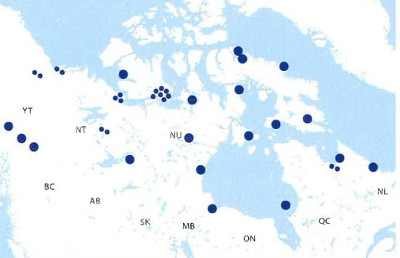
POLAR Funds 41 Projects in 2017-2019
POLAR has a unique role to advance our collective understanding of polar environments by advancing research and mobilizing current knowledge produced by others, in a meaningful and accessible way, to address the gaps and concerns of Northern communities. As a result of POLAR’s 2017-2019 funding process, 41 projects across Canada’s North were chosen to receive funding. In addition, five projects were funded through a joint call with the Marine Environmental Observation Prediction and Response Network (MEOPAR) and the Arctic Research Foundation.
POLAR presents Northern Science Award to Dr. John England at Arctic Change 2017
POLAR was well represented at Arctic Change 2017 in Quebec City in December, a gathering of over 1500 arctic researchers from around the world. At the conference banquet, POLAR Chairperson Richard Boudreault presented the 2017 Northern Science Award to Dr. John England, Professor Emeritus of Earth and Atmospheric Sciences at the University of Alberta, for his fundamental contributions to understanding of the environmental and climatic history of Canada’s Arctic Islands. The annual award honours a significant contribution to meritorious knowledge and understanding of the Canadian North and the transformation of knowledge into action. Nominations are now open for the 2018 Northern Science Award. More information
A Successful 2017 Research Season
POLAR had a very full research season in Cambridge Bay this year, with over 1,600 researcher-days. Here are a few examples of the projects:
- Baseline studies and monitoring programs in tundra, lake, stream and marine ecosystems of the Canadian High Arctic Research Station (CHARS) Experimental and Reference Area, located close to Cambridge Bay, which comprises tundra, freshwater and marine ecosystems
- Using Indigenous knowledge and electronic monitoring to track movements and migrations of arctic char, to help maintain healthy populations (Fisheries and Oceans Canada)
- Aerial surveys of snow and sea ice (British Antarctic Survey)
- Oceanographic exploration to provide a baseline description of geochemistry, biology and physical oceanography (Arctic Research Foundation)
- Arctic-Boreal Vulnerability Experiment (ABoVE), a large-scale, ten–year study of environmental change in Alaska and Northwestern Canada and the ecological and social implications. This summer, the project used aircraft-mounted sensors to gather information that will improve understanding of how greenhouse gases and carbon move between the surface and the atmosphere (NASA)
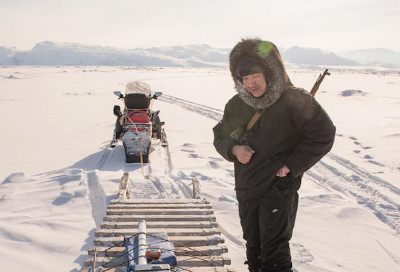
POLAR also supported research across the North, much of which integrated Indigenous knowledge. One of these is SmartICE Pond Inlet, a project that combines local expertise with sea-ice thickness technology to improve sea-ice information and forecasting services for ice travel in the Pond Inlet, Nunavut area (Memorial University of Newfoundland). Another project, the Hudson Bay Consortium, works with Inuit hunters in eastern Hudson Bay communities to gather their knowledge and perspectives on environmental change in the area (Arctic Eider Society).
Call for Interest: Canadian IASC Representatives
Polar Knowledge Canada (POLAR) is seeking letters of interest with supporting documentation for the appointment of up to two Canadian representatives to three International Arctic Science Committee (IASC) Working Groups: the Marine, Social and Human, and Terrestrial working groups. More information
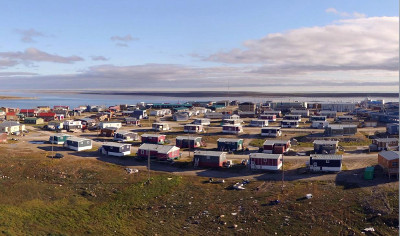
POLAR’s Headquarters in Cambridge Bay
POLAR’s Science and Technology and Knowledge Management and Engagement divisions have a year-round presence in Cambridge Bay, Nunavut. Much of POLAR’s staff is operating there on a full-time basis. Inuit staff are working in areas like field operations, administration, building partnerships, and more – making connections between Indigenous knowledge and science. To meet its obligations under the Nunavut Agreement, POLAR is committed to increasing representation of Nunavut Inuit in its workforce, and is supporting pre-employment training initiatives and career advancement.
Canada 150 Events: Canada C3 and the Freshwater BioBlitz
POLAR hosted the Canada C3 expedition when it stopped at Cambridge Bay in August. Events included the Fish Eye project Live Dive that showcased the marine ecosystem in Cambridge Bay for people across the country. POLAR and Canada C3 co-hosted a community celebration, featuring a panel discussion about post-secondary education and studying science.
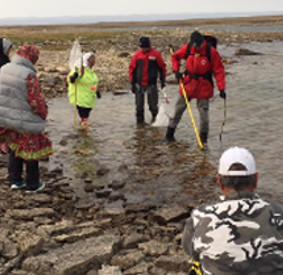
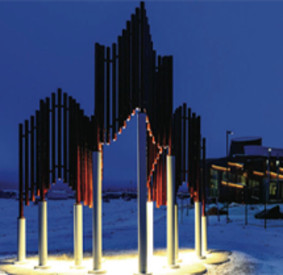
The Cambridge Bay Bioblitz (August 13-14, 2017), led by POLAR in partnership with the Hamlet of Cambridge Bay, the Canadian Wildlife Federation, Université du Québec à Chicoutimi and University of Waterloo, gave residents of the community the opportunity to work alongside taxonomists and naturalists to survey and document different marine life and habitats in nearshore ecosystems.
POLAR Iconic Structure
A distinctive new sculpture has been installed outside the Main Research Building of the CHARS campus. The iconic structure, an array of illuminated copper-coloured steel tubes, represents Northern Canada by combining the northern lights and the Canadian maple leaf in one symbol.